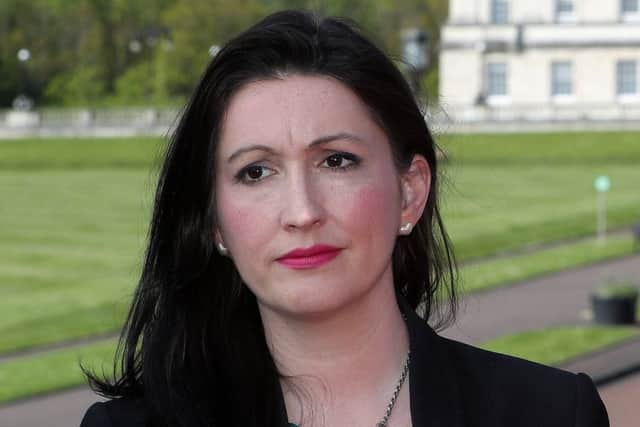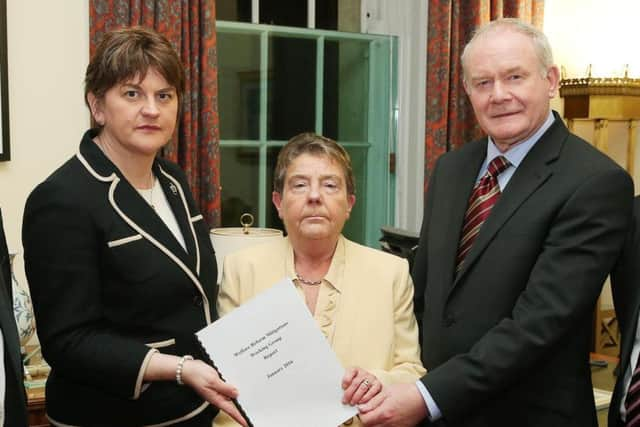Universal Credit: We were panicking for a month, says working father-of-three


A young Belfast family panicked for a month thinking they were going to lose all their benefits after switching to Universal Credit.
Stan Morrison, a public sector finance administrator in his early 30s, is married to Anne (their real names are being withheld) and they have three children under five.
Advertisement
Hide AdAdvertisement
Hide AdAnne has no wage since she took a career break while Stan works 36 hours per week for £18,000 per year.


They were getting child benefit and tax credit to supplement his wage, totalling just under £170 per week.
Stan was always “proactive” and when he saw Universal Credit being rolled out, he decided to switch over.
Their problems began when he went for an appointment to finish his application.
Advertisement
Hide AdAdvertisement
Hide Ad“We normally received our tax credit and child benefit on a weekly basis. But at the end of the appointment they said, ‘Right, we can’t give you too much information on this but your claim of Universal Credit will be active from now. You will stop receiving tax credit from now’.


“I was a bit taken aback by that, and I said: ‘Look, you will appreciate that to us this is our second income. How long will we be without this? Is there an up front payment you can make or something like that?’.”
He “felt alarm bells ringing” and logged on to one of their computers. It said their entitlement to Universal Credit was zero.
He was “taken aback” and told them that he would not have switched over if he had known the problems he would face. But he was simply told that there was no going back.
Advertisement
Hide AdAdvertisement
Hide AdHe contacted the office of UUP MLA Andy Allen, which clarified that their UC account had not been updated.


“So after that, a period of two weeks of a bit of panic and not knowing where we stood, it was resolved. However, it took about four weeks until the new money kicked in.”
The MLA secured an interest-free loan of £250 from the Jobs Office to see him through the gap, which now has to be repaid over six months.
But the £250 was nowhere near the £664 they would have received for the month, putting them under pressure.
Advertisement
Hide AdAdvertisement
Hide Ad“I work for my money. I don’t like hand outs. Everybody that gets tax credits is in a job and working, you pay your tax and national insurance.


“We have a young family and everything is budgeted. And when something comes along that disrupts that it can be stressful. For a month I thought I had lost us a couple of hundred pounds a month.”
The mounting rental arrears caused by the new Universal Credit benefit could become “a tsunami of a problem” for Northern Ireland, it is predicted.
The warning came from John McClean, chief executive of social housing provider the Radius Housing Association, which has some 13,000 tenants across NI.
Advertisement
Hide AdAdvertisement
Hide AdSome 40,000 people have moved to Universal Credit (UC) in NI so far. However, JPI Freedom Of Information research has found that 92% of UC claimants who are tenants with the NI Housing Executive (NIHE) are in arrears, compared to only 40% of tenants on housing benefit. Their average arrears is £700 compared to £192 respectively. As a result, UC claimants have incurred £2.5m rental arrears with NIHE.
“Many people don’t know these [NIHE] figures and that is why I am really pleased that you have requested the information, it is now out there in the public domain, we have struggled for a long time to actually have good anecdotal evidence,” said Mr McClean.
The average rental arrears for Radius tenants on UC is probably about 2.5 times that of someone on housing benefit, similar to the NIHE figures, he said.


“It is an area very close to our hearts at the moment. Welfare reform and UC in particular, although our fear is that the situation is going to get worse with bedroom tax when mitigation measures put in place by Stormont ends next year. The impact on individuals and associations as businesses is massive. It will become a really big issue unless we unless we try to affect somehow the flawed policy as it stands.”
Advertisement
Hide AdAdvertisement
Hide AdOnly 5% of Radius’ 13,000 tenants have moved across to UC so far.
“Many families do incredible budget management when it comes to things like school uniforms and Christmas. They are just about keeping it together and then along comes a period of transition from housing benefit to UC and for five or six weeks while your assessment is under review you are living with no money.
“As a result such families may end up borrowing from doorstep lenders, depending on food banks and borrowing from family and friends.”
Under-pressure Radius tenants try to cope by cutting back on heating, which can lead to damp. Radius is seeking out vulnerable tenants to help them avoid eviction.
Advertisement
Hide AdAdvertisement
Hide Ad“Inevitably I am sure there will be some tension which will come that way.”
Housing associations borrow money to build new houses, but the growing debt will impact on their ability to do this, he said.
Stormont’s mitigation payments to cover the new bedroom tax end in March 2020, which could cost Radius £1.5m per year.
The projected rental arrears from UC could bring the figure up to £2m per year.
Advertisement
Hide AdAdvertisement
Hide AdLast year Radius spent £20m maintaining its housing stock, but this will be affected “and this is not me scaremongering”.
He added: “It would be very misleading to think this will no impact on the middle classes.”
Unless the planned reforms are amended, there is no reason to think “that there will not be an increase, ultimately in homelessness ... This ultimately will affect the quality of life for everybody”.
With Brexit likely to reduce the workforce, he said, the welfare system is not set to encourage unemployed people into jobs to compensate, but rather to leave them “in a desperate state”.
Advertisement
Hide AdAdvertisement
Hide AdThis could potentially be linked to more crime and “massive pressure” on the health service to cope with rising mental health problems.
It would be very helpful if the £585m welfare reform mitigation package agreed by Stormont in 2016 could be extended past its March 2020 end date, he said.
Bedroom tax was supposed to encourage people to move to smaller accommodation but it did not take into account the shortage of single unit accommodation in NI, he added. So the tax could have a major impact both on tenants and their landlords.
“Universal Credit has only come in and I can definitely envisage a situation where right across the Housing Executive and the social housing sector, when we have wholesale movement across to Universal Credit, this really could be a tsunami of a problem.”
Advertisement
Hide AdAdvertisement
Hide AdThe Department of Communities has told the News Letter that it is implementing Universal Credit and Welfare Reform as per policy decided upon by the Stormont Executive.
It also noted the Executive had secured a special mitigation package for NI.
In 2016, the Executive established a social security ‘mitigation’ package, a pot of £585m designed to alleviate the impact of UK-wide welfare reforms like the bedroom tax and the benefit cap.
However, the package is due to end in March 2020 and there is no NI Executive in place to decide on any extension.
Advertisement
Hide AdAdvertisement
Hide AdAs a result, MPs on the NI Affairs Committee and the Work and Pensions Committee at Westminster have launched a joint inquiry to examine the impact of welfare policy in NI.
They will examine the impact of Universal Credit and the new policy which disallows child benefit for more than two children, if born after April 2017.
NI has the highest proportion of families who would be affected in the UK.
DUP MP Emma Little Pengelly said her party is calling for the government to move swiftly to confirm that the mitigation scheme will continue after 2020.
Advertisement
Hide AdAdvertisement
Hide Ad“There is already anxiety growing across those impacted communities, fearful that the mitigation package will end and they will be left struggling,” she said.
Sinn Fein welfare spokesperson Alex Maskey said almost 40,000 tenants here do not pay ‘bedroom tax’ as a result of the mitigations and have been protected from the benefit cap and other supplementary payments. He said the best “bulwark” against the cuts is “a reformed power-sharing government at Stormont” and is also pressing for an extension.
People Before Profit MLA Gerry Carroll said that not even 60% of the mitigation package has been spent.
Blaming the situation on the DUP and Sinn Fein, he said that “abolishing welfare reform” should be a “red line before any return to Stormont is considered”.
Advertisement
Hide AdAdvertisement
Hide AdMeanwhile, an academic as warned that Northern Ireland will be hit particularly hard by Universal Credit (UC) because it has the largest families in the UK.
Ulster University social policy lecturer Goretti Horgan said that the 2014 report from Sheffield Hallam University found that welfare reform will take £750m a year out of NI.
“This is equivalent to £650 a year for every adult of working age,” she said.
Under welfare reform, child benefit will only be paid for a maximum of two children per family.
Advertisement
Hide AdAdvertisement
Hide Ad“Northern Ireland loses so much through welfare reform because families with children are hardest hit by Universal Credit and we have more families with children – and more children in those families – than in England, Wales or Scotland. Families here are particularly badly hit by the benefit cap and, while that is currently being covered by mitigation payments unique to Northern Ireland, this works only for those who haven’t been moved to Universal Credit.”
Under UC the government plans to reduce numbers receiving the severe disability premium of £70 per week by 20%, she said.
For couples or households with children, the new benefits cap is £384.62 per week, she added.
Pastor Tony Meehan from the West Belfast Food Bank also notes that poverty indicators have risen significantly.
Advertisement
Hide AdAdvertisement
Hide Ad“From April 2018 to April 2019 we fed 898 families, 58% directly affected by Universal Credit,” he said. “The year before it was only 757 families.”
In 2017/18 food bank usage for Co Antrim increased by 23% and by 159% in Fermanagh, he said.
“It is crazy. They expect people to have savings for up to six weeks without any benefits during processing.
“For the first time, claimants must do their own application – and online. But what about those who are illiterate or dyslexic or alcoholic? There is no safety net or safeguards,” he added.
Advertisement
Hide AdAdvertisement
Hide AdThere will be “widespread chaos” when a further 260,000 people in NI move across to UC by 2023, he said.
:: The Advice NI helpline number is freephone 0808 802 0020
:: Age NI advisors can give confidential advice on 0808 808 7575